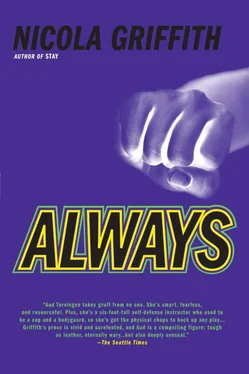“Whatever it takes.” Fast and free and fluid.
“You improvise. Exactly. That’s what life is, one big improv session.”
“Improvisation is not… reliable.”
“No. But that’s the way it is—”
Shoulds don’t matter.
“—life is about doing the best you can. Living with ambiguity. Risking failure. Letting go of the notion of perfection.”
We reflected on our shoes for a while.
“So tell me more about this furniture you hated so much.”
“I didn’t hate it,” I said, surprised. “It was fascinating. Some of the pieces looked as impossible as the flight of a jumbo jet.” Yet they had cried out to be touched. For the drawer to be pulled in and out, sliding with the extravagant precision of a luxury handgun. For flesh and bone to trace the intersection of one plane with another, follow the distribution of tension across space, weigh the amazement of an empty fulcrum—a false one, a joke, if you like—until you figure out the real center. Yet it had all felt like lies. “You know what it was? It wouldn’t just stand there and be. It tried to hide behind its own cleverness. It wasn’t brave.”
“Furniture as philosophy?”
“You’d think so, from the catalogue.” I related snippets of the catalogue blurb, quoting liberally from the artists’ statements.
“They said it was what?” he said.
“A chair taken seriously as such,” I repeated. “A chair truly interrogated, a chair raised to the level of a question.”
“Is that right,” he said, and shook his head, and we both laughed.
ON THEdrive to the Tully’s in Ballard, the sun came out and stayed out, and the car began to smell comfortably of Dornan’s new leather jacket and the bag of unground beans he’d bought on Capitol Hill. The red brick of the side streets glowed and for a moment the city looked almost European.
I’d let him pick the radio station. He chose jazz. I listened and tried to understand why people liked it. It reminded me of the Wiram furniture: afraid to stand still and be known.
“About my mother,” I said. “She sent e-mail from the plane last night. She’s arriving this afternoon and will call my room at the Edgewater.” Only Dornan, Luz, and Bette had my cell phone number. “They’ll be jet-lagged, so I’ll meet her for an early cocktail in her suite, their suite, and spend more time with her tomorrow—which is when you can meet her, if you like.”
He nodded. “We’re still on for visiting your film set this evening?”
“Yes.” I slowed behind a pickup truck that seemed to think twenty-five miles an hour was degenerate and risky. “After lunch, do you want to go to the museum?”
“Shouldn’t you be getting back in case your mum calls?”
“I spent too many years as a child sitting and waiting for a phone call.” I accelerated past the truck.
“I think we could slow down a little.”
“Sorry.” I eased back on the accelerator.
“It’ll be fine,” he said. “You’ll be fine.”
I nodded.
“Have you considered taking her a gift of something, a present? Flowers, maybe.”
“Flowers?”
“I always take my mum flowers.”
He liked his mother.
AFTER LUNCHI went to the Pike Place market and bought calla lilies, and then walked along Western to buy a Loetz glass vase—art nouveau, in iridescent blue-green and silver—to put them in. When I got back to my dim hotel room, I filled the vase and trimmed the flowers and wondered how I would get the full vase and loose flowers to the Fairmont. So I put the stems in two tooth mugs—I had to prop the flowers against the bathroom mirror— poured the water out of the vase, and dried it with a towel, which left lint all over it. And then the lilies, which were too long to stay in the tooth mugs, fell out and smeared the mirror with pollen, which, when I wiped it away with a hand towel, stained the white cotton deep orange. I started to feel the way I had when I was five and had tried, for Mother’s Day—which in England is in March—to make a collage of spring flowers poking through the snow from sugar paper and glue and Rice Crispies, and ended up ruining the granite counter in the kitchen. The smell of the lilies was thick and cloying, and the center of the flowers, with their deep, speckled pink throats and thrusting yellow stamen tongues, looked diseased. I threw them in the bin.
The room was too hot and smelled heavy and sweet, like rotting jungle. My scalp itched with sweat. My heart rate was high, close to ninety, my breathing shallow, my muscles trembling very slightly. Dornan and his stupid caffeine.
I called room service and ordered chamomile tea, and then opened the armoire, sat on the bed, and surveyed my wardrobe.
My mother was used to the high fashion of London, and if we had been meeting in a chic restaurant in, say, Atlanta, the occasion would have demanded the Vera Wang dress or the Armani or Max Mara suit, but this was Seattle, and I was her daughter, and the meeting would be private.
The first time I remembered my mother talking about clothes was when I was ten years old and we went shopping together. Normally, I would go with my father, when he was in town, or one of my mother’s smooth-faced assistants. I picked whatever I liked, without consultation, and they paid. Sometimes, if I was in Yorkshire, I went with my friend, Christie Horley, the Honourable Miss Christie, whose purse was held by her nanny, or, on rare occasions, her older sister. At those times Christie and I picked things for each other, commented rudely on each other’s choices, laughed, tried on something else. On the day I went with my mother to the designer boutique of a London department store to find a jacket, I wasn’t sure who was supposed to choose. I would lift a hanger from the rail, hold the jacket against myself, and look at my mother. She would nod in her noncommittal diplomat’s way: I acknowledge the jacket. I got more and more restless; I was doing something wrong, but I didn’t know what, or what to do about it. Looking back, she probably had no more idea of how to go mother-daughter shopping than I did, and neither of us was capable of simply asking the other for opinions or suggestions: asking made one vulnerable. Eventually, after about fifteen jackets, clumsy with self-consciousness and embarrassment, I tried to jam the hanger back on the wrong rail, which was full, and the jacket fell on the floor. I wanted her to hold out her arms, I wanted to run away and cry, I wanted to kill something. “This is a stupid shop and I don’t want a stupid jacket!” She nodded, picked up her purse, and said, With clothes, err on the side of elegance: rich but simple, in color, cut, and cloth. I nodded as though I understood, and she stood, and we left. We went to a tea shop and drank coffee. What we wear sends a message, she said, as though we’d been having a continuous discussion on the matter. It broadcasts our confidence, our means, our taste. You can insult a host by underdressing, and hurt a friend by overdressing. If in doubt, choose simple style and top-quality cloth. Casual elegance.
It was useful advice, but I had gone home that day without a jacket, and I never went shopping with my mother again.
I wondered, as I pulled on a sleek, forest green silk-and-cashmere turtleneck, beautifully cut lamb’s wool skirt, and four-hundred-dollar boots, if my mother had any friends. It was difficult to picture her at a party other than a polished diplomatic function. No nightclubs, or walking tours of the Mediterranean, or weekends in wine country. I couldn’t imagine where she had met Eric. I remembered the photo of her, laughing. Perhaps a charity hacking event. Did they shop together? For what kind of clothes?
Читать дальше












